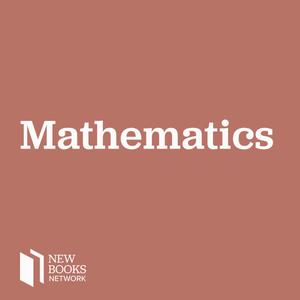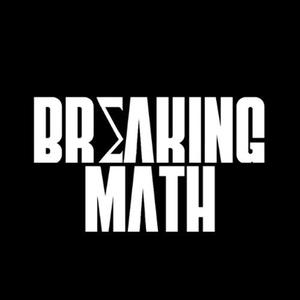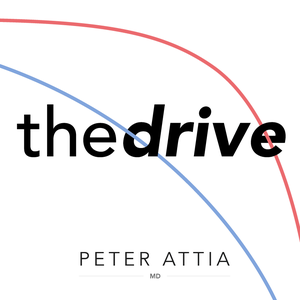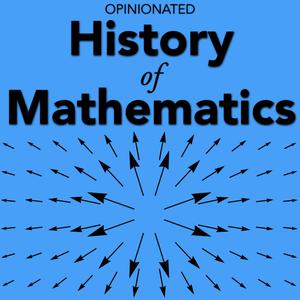
New Books in Mathematics
Interviews with Mathematicians about their New Books
- 40 minutesLuci Pangrazio and Neil Selwyn, "Critical Data Literacies: Rethinking Data and Everyday Life" (MIT Press, 2023)
Data has become a defining issue of current times. Our everyday lives are shaped by the data that is produced about us (and by us) through digital technologies. In Critical Data Literacies: Rethinking Data and Everyday Life (MIT Press, 2023), Luci Pangrazio and Neil Selwyn introduce readers to the central concepts, ideas, and arguments required to make sense of life in the data age. Bringing together cutting-edge thinking and discussion from across education, sociology, psychology, and media and communication studies, Critical Data Literacies develops a powerful argument for collectively rethinking the role that data plays in our everyday lives and re-establishing agency, free will, and the democratic public sphere.
In the episode, Luci Pangazio discusses how the tradition of critical literacies can offer a powerful foundation to address the big concerns of the data age, such as issues of data justice and privacy, algorithmic bias, dataveillance, and disinformation. We challenge the idea that datafication is an inevitable and inescapable condition.
This interview was conducted by Shreya Urvashi, a doctoral researcher of sociology and education based in Toronto, Canada.
Learn more about your ad choices. Visit megaphone.fm/adchoices
Support our show by becoming a premium member! https://newbooksnetwork.supportingcast.fm/mathematics
19 December 2024, 9:00 am - 54 minutes 53 secondsMichael Gavin, "Literary Mathematics: Quantitative Theory for Textual Studies" (Stanford UP, 2022)
Across the humanities and social sciences, scholars increasingly use quantitative methods to study textual data. Considered together, this research represents an extraordinary event in the long history of textuality. More or less all at once, the corpus has emerged as a major genre of cultural and scientific knowledge. In Literary Mathematics: Quantitative Theory for Textual Studies (Stanford UP, 2022), Michael Gavin grapples with this development, describing how quantitative methods for the study of textual data offer powerful tools for historical inquiry and sometimes unexpected perspectives on theoretical issues of concern to literary studies.
Student-friendly and accessible, the book advances this argument through case studies drawn from the Early English Books Online corpus. Gavin shows how a copublication network of printers and authors reveals an uncannily accurate picture of historical periodization; that a vector-space semantic model parses historical concepts in incredibly fine detail; and that a geospatial analysis of early modern discourse offers a surprising panoramic glimpse into the period's notion of world geography. Across these case studies, Gavin challenges readers to consider why corpus-based methods work so effectively and asks whether the successes of formal modeling ought to inspire humanists to reconsider fundamental theoretical assumptions about textuality and meaning. As Gavin reveals, by embracing the expressive power of mathematics, scholars can add new dimensions to digital humanities research and find new connections with the social sciences.
Michael Gavin is Associate Professor of English at the University of South Carolina and author of The Invention of English Criticism, 1650-1760 (2015)
Morteza Hajizadeh is a Ph.D. graduate in English from the University of Auckland in New Zealand. His research interests are Cultural Studies; Critical Theory; Environmental History; Medieval (Intellectual) History; Gothic Studies; 18th and 19th Century British Literature. YouTube channel. Twitter.
Learn more about your ad choices. Visit megaphone.fm/adchoices
Support our show by becoming a premium member! https://newbooksnetwork.supportingcast.fm/mathematics
9 September 2024, 8:00 am - 54 minutes 18 secondsAl Posamentier and Christian Speitzer, “The Mathematics of Everyday Life” (Prometheus Books, 2018)
Today I talked to Al Posamentier about his books (co-authored with Christian Speitzer) The Mathematics of Everyday Life (Prometheus Books, 2018). We all are told – practically from the moment we enter school – that mathematics is important because it permeates practically all aspects of our lives. But, for the most part, we don’t really notice it except for those moments, such as when we balance a checkbook, that we know we’re doing mathematics. This book, which requires nothing more than high-school math, is a wonderful way to see that mathematics really is all around us, in our home, in our workplace, in the entertainments we enjoy, and in the world we live in.
Learn more about your ad choices. Visit megaphone.fm/adchoices
Support our show by becoming a premium member! https://newbooksnetwork.supportingcast.fm/mathematics
8 September 2024, 8:00 am - 52 minutes 8 secondsBrian Clegg, "Ten Patterns That Explain the Universe" (MIT Press, 2021)
Our universe might appear chaotic, but deep down it's simply a myriad of rules working independently to create patterns of action, force, and consequence. In Ten Patterns That Explain the Universe (MIT Press, 2021), Brian Clegg explores the phenomena that make up the very fabric of our world by examining ten essential sequenced systems. From diagrams that show the deep relationships between space and time to the quantum behaviors that rule the way that matter and light interact, Clegg shows how these patterns provide a unique view of the physical world and its fundamental workings.
Guiding readers on a tour of our world and the universe beyond, Clegg describes the cosmic microwave background, sometimes called the "echo of the big bang," and how it offers clues to the universe's beginnings; the diagrams that illustrate Einstein's revelation of the intertwined nature of space and time; the particle trail patterns revealed by the Large Hadron Collider and other accelerators; and the simple-looking patterns that predict quantum behavior (and decorated Richard Feynman's van). Clegg explains how the periodic table reflects the underlying pattern of the configuration of atoms, discusses the power of the number line, demonstrates the explanatory uses of tree diagrams, and more.
Galina Limorenko is a doctoral candidate in Neuroscience with a focus on biochemistry and molecular biology of neurodegenerative diseases at EPFL in Switzerland. To discuss and propose the book for an interview you can reach her at [email protected].
Learn more about your ad choices. Visit megaphone.fm/adchoices
Support our show by becoming a premium member! https://newbooksnetwork.supportingcast.fm/mathematics
2 September 2024, 8:00 am - 1 hour 18 minutesDavid J. Hand, "Dark Data: Why What You Don't Know Matters" (Princeton UP, 2020)
There is no shortage of books on the growing impact of data collection and analysis on our societies, our cultures, and our everyday lives. David Hand's new book Dark Data: Why What You Don't Know Matters (Princeton University Press, 2020) is unique in this genre for its focus on those data that aren't collected or don't get analyzed. More than an introduction to missingness and how to account for it, this book proposes that the whole of data analysis can benefit from a "dark data" perspective—that is, careful consideration of not only what is seen but what is unseen. David assembles wide-ranging examples, from the histories of science and finance to his own research and consultancy, to show how this perspective can shed new light on concepts as classical as random sampling and survey design and as cutting-edge as machine learning and the measurement of honesty. I expect the book to inspire the same enjoyment and reflection in general readers as it is sure to in statisticians and other data analysts.
Suggested companion work: Caroline Criado Perez, Invisible Women: Data Bias in a World Designed for Men.
Cory Brunson (he/him) is a Research Assistant Professor at the Laboratory for Systems Medicine at the University of Florida.
Learn more about your ad choices. Visit megaphone.fm/adchoices
Support our show by becoming a premium member! https://newbooksnetwork.supportingcast.fm/mathematics
8 July 2024, 8:00 am - 1 hour 1 minuteAnn Johnson and Johannes Lenhard, "Cultures of Prediction: How Engineering and Science Evolve with Mathematical Tools" (MIT Press, 2024)
A probing examination of the dynamic history of predictive methods and values in science and engineering that helps us better understand today's cultures of prediction.
The ability to make reliable predictions based on robust and replicable methods is a defining feature of the scientific endeavor, allowing engineers to determine whether a building will stand up or where a cannonball will strike. Cultures of Prediction: How Engineering and Science Evolve with Mathematical Tools (MIT Press, 2024), which bridges history and philosophy, uncovers the dynamic history of prediction in science and engineering over four centuries. Ann Johnson and Johannes Lenhard identify four different cultures, or modes, of prediction in the history of science and engineering: rational, empirical, iterative-numerical, and exploratory-iterative. They show how all four develop together and interact with one another while emphasizing that mathematization is not a single unitary process but one that has taken many forms.
The story is not one of the triumph of abstract mathematics or technology but of how different modes of prediction, complementary concepts of mathematization, and technology coevolved, building what the authors call “cultures of prediction.” The first part of the book examines prediction from early modernity up to the computer age. The second part probes computer-related cultures of prediction, which focus on making things and testing their performance, often in computer simulations. This new orientation challenges basic tenets of the philosophy of science, in which scientific theories and models are predominantly seen as explanatory rather than predictive. It also influences the types of research projects that scientists and engineers undertake, as well as which ones receive support from funding agencies.
Nikki Stevens, PhD is a critical technology researcher and software engineer. Find more of their work here.
Learn more about your ad choices. Visit megaphone.fm/adchoices
Support our show by becoming a premium member! https://newbooksnetwork.supportingcast.fm/mathematics
24 June 2024, 8:00 am - 56 minutes 44 secondsPaulina Rowinska, "Mapmatics: How We Navigate the World Through Numbers" (Pan Macmillan, 2024)
How does a delivery driver distribute hundreds of packages in a single working day? Why does remote Alaska have such a large airport? Where should we look for elusive serial killers? The answers lie in the crucial connection between maps and maths.
In Mapmatics: How We Navigate the World Through Numbers (Pan Macmillan, 2024), Dr Paulina Rowinska embarks on a fascinating journey to discover the mathematical foundations of cartography and cartographical influences on mathematics.
From a sixteenth-century map that remains an indispensable navigation tool despite emphasising the North–South divide to public transport maps that both guide and mislead passengers, she reveals how maps and maths shape not only our sense of space and time but also our worldview.
Through entertaining stories, surprising real-world examples and a cast of unforgettable characters, Mapmatics helps us to appreciate the mathematical methods and ideas behind maps. And, by illuminating how our world works, leaves us better equipped to understand and look after it.
This interview was conducted by Dr. Miranda Melcher whose new book focuses on post-conflict military integration, understanding treaty negotiation and implementation in civil war contexts, with qualitative analysis of the Angolan and Mozambican civil wars.
Learn more about your ad choices. Visit megaphone.fm/adchoices
Support our show by becoming a premium member! https://newbooksnetwork.supportingcast.fm/mathematics
19 June 2024, 8:00 am - 54 minutes 24 secondsDavid S. Richeson, "Tales of Impossibility: The 2000-Year Quest to Solve the Mathematical Problems of Antiquity" (Princeton UP, 2019)
David S. Richeson's book Tales of Impossibility: The 2000-Year Quest to Solve the Mathematical Problems of Antiquity (Princeton University Press, 2019) is the fascinating story of the 2000 year quest to solve four of the most perplexing problems of antiquity: squaring the circle, duplicating the cube, trisecting the angle, and constructing regular polygons. The eventual conclusion was that all four of these problems could not be solved under the conditions laid out millennia ago. But it's also an engaging tale of some of the greatest mathematicians, and some not-so-well known ones, who met the challenge and moved mathematics forward in ways that the Greek geometers could never have envisioned. Even if you never read a single proof through to its conclusion, you'll enjoy the many entertaining side trips into a geometry far beyond what you learned in high school.
Learn more about your ad choices. Visit megaphone.fm/adchoices
Support our show by becoming a premium member! https://newbooksnetwork.supportingcast.fm/mathematics
28 May 2024, 8:00 am - 50 minutes 35 secondsThomas A. Garrity, "All the Math You Missed (But Need to Know for Graduate School)" (Cambridge UP, 2021)
Graduate students in many programs besides mathematics will need to be familiar with the methods and results of a variety of mathematical topics. Just as importantly, these students will need to develop a level of mathematical maturity—how to think in broad strokes about the subject, how to study it, and even how to communicate their work. The gap between undergraduate training and graduate requirements can also give rise to misconceptions about how mathematics is done and what needs drive cutting-edge research.
Thomas A. Garrity's book All the Math You Missed (But Need to Know for Graduate School), now in its second edition (Cambridge UP, 2021), is a wide bridge across this gap—i do believe the material will bring any rising graduate student to readiness in the subject, whatever their needs. But it provides much more: Readers gain an intuition about the results and how they cohere that may be years coming through coursework alone; and an exposure to the culture of the mathematics community through historical vignettes, folklore, and prevailing beliefs (e.g. on the Riemann Hypothesis and whether P = NP). For such a broad introduction, the book is also surprisingly self-contained, and the chapters chart a uniformly continuous path through its topics.
In our interview, Dr. Garrity recounted the origins of the book, described his outlook on undergraduate and graduate mathematics, and elaborated on the style(s) he adopted across its topics. We also got into the choices of content and depth he made and what role both editions have played over 23 years. The discussion resonated with several of my own experiences, and in any event i plan to keep my copy of the book handy for any (undergraduate or graduate) students i teach or mentor in future.
Suggested companion works:
• Saunders MacLane, Mathematics Form and Function
• Timothy Gowers, June Barrow-Green, and Imre Leader (ed.), The Princeton Companion to Mathematics
Thomas A. Garrity is the Webster Atwell Class of 1921 Professor of Mathematics at Williams College, Massachusetts, where he was the director of the Williams College Project for Effective Teaching for many years. Among his awards are Rice University's Nicolas Salgo Outstanding Teaching award and the Haimo award of the MAA. His other books include Algebraic Geometry: A Problem Solving Approach (2013, co-authored) and Electricity and Magnetism for Mathematicians (2015).
Learn more about your ad choices. Visit megaphone.fm/adchoices
Support our show by becoming a premium member! https://newbooksnetwork.supportingcast.fm/mathematics
10 May 2024, 8:00 am - 1 hour 20 minutesKevin Lambert, "Symbols and Things: Material Mathematics in the Eighteenth and Nineteenth Centuries" (U Pittsburgh Press, 2021)
The stereotype of the solitary mathematician is widespread, but practicing users and producers of mathematics know well that our work depends heavily on our historical and contemporary fellow travelers. Yet we may not appreciate how our work also extends beyond us into our physical and societal environments.
Kevin Lambert takes what might be a first crack at this perspective in his book Symbols and Things: Material Mathematics in the Eighteenth and Nineteenth Centuries (University of Pittsburgh Press, 2021). An historian of science, Dr. Lambert has shifted in his view of mathematics as a language of science to one as a material practice. Expanding on ideas from historians, archeologists, philosophers, and other scholars of human activity, and through several interweaving vignettes of mathematical work during a technologically dynamic period in British history, he argues that mathematical practice, communication, and even thought occur to a large degree outside the bodies of the persons performing them.
In this interview, we explore Kevin's journal to and through this book project. We discuss how such ideas as Andy Clark's extended mind informed his approach, and we review several of the lively stories—the co-creation of the long-distance mathematical community with the research journal, Peacock's museological argument for the adoption of symbolic algebra, and the foundational entanglement of electromagnetism, quaternions, and the philosophy of space, among others—he drew out of historical and archival sources. (Here i cannot resist mentioning Tait's collection of his intensive correspondence with Hamilton that transformed how quaternions were applied in physics and even conceptualized as mathematical objects.) We close with some thoughts on our own materially extended cognitive work and where Kevin's interests are currently driving him.
Suggested companion works:
• ChatGPT, as a cutting-edge extension of human thought
• work by Courtney Ann Roby, including the forthcoming The Mechanical Tradition of Hero of Alexandria: Strategies of Reading from Antiquity to the Early Modern Period
• Algorithmic Modernity: Mechanizing Thought and Action, 1500-2000, edited by Morgan G. Ames and Massimo Mazzotti
• work by Emily Miller Bonney, for example "A Reconsideration of Depositional Practices in Early Bronze Age Crete"
Kevin Lambert is a historian of science and mathematics in the early modern and modern periods and professor in the liberal studies department at California State University, Fullerton. His recent book Symbols and Things explores mathematics as a way of thinking outside the body and through the material environment. He also recently published a chapter in the volume Algorithmic Modernity that traces the genealogy of algorithmic practices. He is now working on the problem of writing longue durée histories of science. He is close to completing a paper called “Malthus in the Landscape” that investigates the temporalities of global histories. He is also exploring the problem of writing a global history of the early modern sciences without the prism of the so called “Scientific Revolution.” His work can be found on ResearchGate.
Learn more about your ad choices. Visit megaphone.fm/adchoices
Support our show by becoming a premium member! https://newbooksnetwork.supportingcast.fm/mathematics
15 April 2024, 8:00 am - 39 minutes 40 secondsIsmar Volić, "Making Democracy Count: How Mathematics Improves Voting, Electoral Maps, and Representation" (Princeton UP, 2024)
What's the best way to determine what most voters want when multiple candidates are running? What's the fairest way to allocate legislative seats to different constituencies? What's the least distorted way to draw voting districts? Not the way we do things now. Democracy is mathematical to its very foundations. Yet most of the methods in use are a historical grab bag of the shortsighted, the cynical, the innumerate, and the outright discriminatory. Making Democracy Count: How Mathematics Improves Voting, Electoral Maps, and Representation (Princeton UP, 2024) sheds new light on our electoral systems, revealing how a deeper understanding of their mathematics is the key to creating civic infrastructure that works for everyone.
In this timely guide, Ismar Volic empowers us to use mathematical thinking as an objective, nonpartisan framework that rises above the noise and rancor of today's divided public square. Examining our representative democracy using powerful clarifying concepts, Volic shows why our current voting system stifles political diversity, why the size of the House of Representatives contributes to its paralysis, why gerrymandering is a sinister instrument that entrenches partisanship and disenfranchisement, why the Electoral College must be rethought, and what can work better and why. Volic also discusses the legal and constitutional practicalities involved and proposes a road map for repairing the mathematical structures that undergird representative government.
Making Democracy Count gives us the concrete knowledge and the confidence to advocate for a more just, equitable, and inclusive democracy.
Learn more about your ad choices. Visit megaphone.fm/adchoices
Support our show by becoming a premium member! https://newbooksnetwork.supportingcast.fm/mathematics
1 February 2024, 9:00 am - More Episodes? Get the App
Your feedback is valuable to us. Should you encounter any bugs, glitches, lack of functionality or other problems, please email us on [email protected] or join Moon.FM Telegram Group where you can talk directly to the dev team who are happy to answer any queries.
 Breaking Math Podcast
Breaking Math Podcast
 Up First from NPR
Up First from NPR
 The Peter Attia Drive
The Peter Attia Drive
 Opinionated History of Mathematics
Opinionated History of Mathematics
 In Our Time
In Our Time